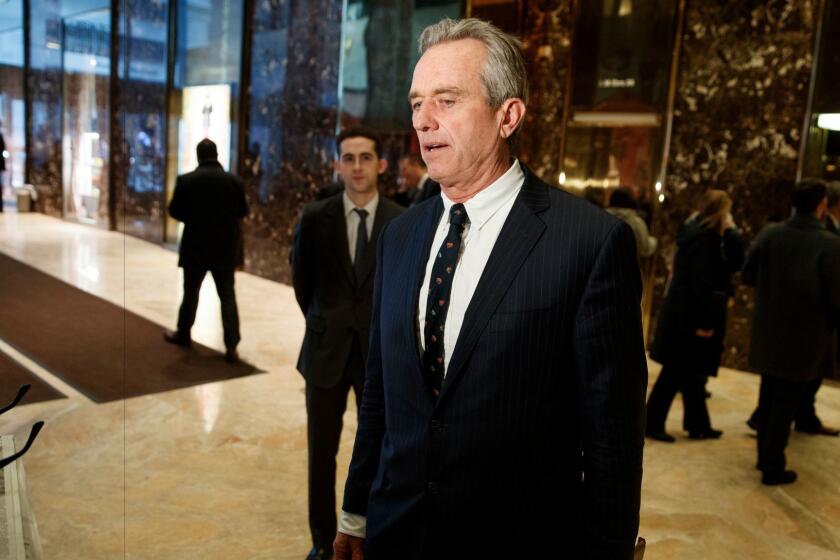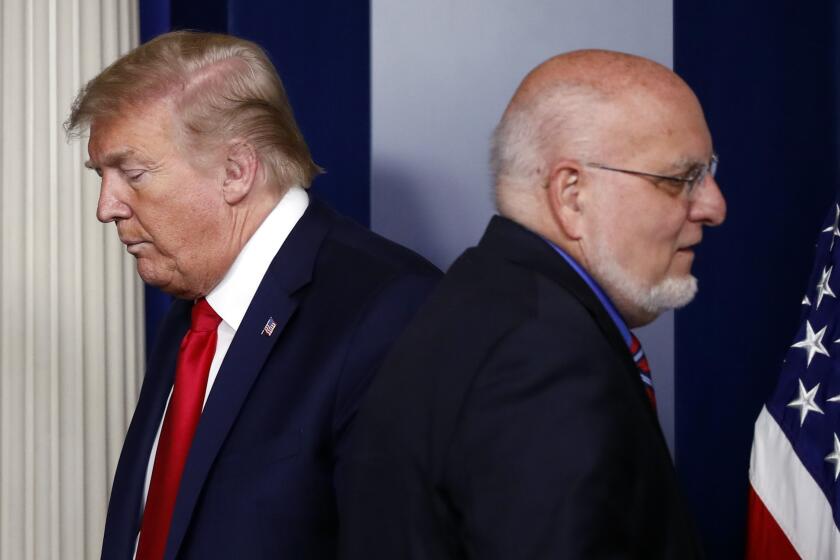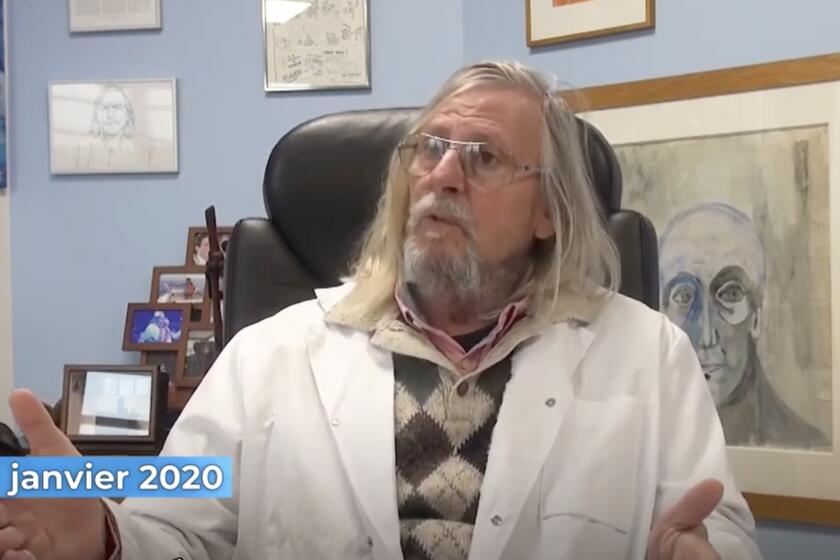Column: Trump attacks Biden and Harris as anti-vaccine, but he’s the one with the anti-vaxx record
- Share via
Donald Trump’s habit of projecting his own failings onto his adversaries reached a new level of absurdity on Labor Day, when he attacked the Democratic ticket of Joe Biden and Kamala Harris for “reckless anti-vaccine rhetoric” and accused them of a position that “undermines science.”
Throughout his tenure, as we’ve reported at length, it’s Trump who has undermined science.
That’s never been more true than in his approach to the coronavirus outbreak, which he has relentlessly downplayed and met by destroying the credibility of the country’s most important scientific agencies, including the Food and Drug Administration.
I’ve seen people where they have a perfectly healthy child, and they go for the vaccinations and a month later the child is no longer healthy.
— Donald Trump on vaccines, 2012
As for “reckless anti-vaccine rhetoric,” that defines Trump too. For more than a decade, Trump has promoted the long-debunked and fraudulent claim that vaccines cause autism. He has advocated stretching out the schedule of childhood vaccinations, a practice condemned by creditable pediatric experts.
Trump has made common cause with anti-vaccine cranks such as Robert F. Kennedy Jr., and even lent credence to Andrew Wakefield. He’s the notorious perpetrator of the myth linking autism with the measles, mumps and rubella vaccine, a stance that got Wakefield’s medical license revoked in Britain and that has caused needless disease and suffering in Britain, across Europe and in the U.S.
Trump’s attack on Biden and Harris came after they pointed out, quite properly, that Trump’s push for a vaccine approval before the Nov. 3 election reflected his political concerns and pressured the FDA to approve a vaccine before it was thoroughly vetted by scientists.
Harris said in a CNN interview that she “would not trust Donald Trump” on the safety and efficacy of a vaccine approved before election day. She warned of the likelihood that under Trump’s thumb, public health experts and scientists won’t get the last word on the vaccine.
“If past is prologue,” Harris said, “they’ll be muzzled, they’ll be suppressed. They’ll be sidelined.”
Scientific ignorance never lies very deep beneath the claims of the anti-vaccine movement.
This was nothing like anti-vaccine rhetoric, but rather a sound warning drawn from experience: Trump has muzzled, suppressed and sidelined scientific experts at every stage of the pandemic. In modern memory, as we’ve reported, there has been no more anti-science administration in Washington than Trump’s.
Harris and Biden aren’t alone in expressing fears about Trump’s push to approve a vaccine before the election. Numerous experts have done so.
The most damning gloss on Trump’s policy came Tuesday from the drug industry itself. That’s when nine companies involved in the race to develop a vaccine issued a joint statement promising to “uphold the integrity of the scientific process” as they work toward seeking government approval.
The companies, which include Moderna, Johnson & Johnson, Pfizer and Merck, pledged to “only submit for approval or emergency use authorization after demonstrating safety and efficacy through a Phase 3 clinical study that is designed and conducted to meet requirements of expert regulatory authorities such as FDA.”
They stated their reliance on “large, high quality clinical trials that are randomized and observer-blinded, with ... significant numbers of participants across diverse populations.” Never before has the drug industry felt the necessity to specifically promise the public that it will adhere to scientific standards. It’s Trump who made the statement necessary.
The drugmakers’ pledge all but eliminates the possibility that a vaccine for the virus could win government approval before the election.
Phase 3 trials for three candidate vaccines are underway in the U.S., involving recruitment of about 30,000 subjects each. Even the head of Trump’s Operation Warp Speed vaccine drive, former drug executive Moncef Slaoui, has expressed doubts that the recruitments and analysis of trial results can be completed to meet that deadline.
The Trump administration is plainly counting on a vaccine for COVID-19 becoming approved by the Nov. 3 election, in the expectation that news of the discovery will inspire a tide of public optimism that will sweep Trump to reelection.
Now to Trump’s anti-vaccine rhetoric.
As ably documented by quackery watchdog David Gorski, it dates at least to 2007. At a news conference that year, Trump said, “When I was growing up, autism wasn’t really a factor. And now all of a sudden, it’s an epidemic.... My theory, and I study it because I have young children, my theory is the shots. We’ve giving these massive injections at one time, and I really think it does something to the children.”
“When a little baby that weighs 20 pounds and 30 pounds gets pumped with 10 and 20 shots at one time, with one injection that’s a giant injection, I personally think that has something to do with it. Now there’s a group that agrees with that and there’s a group that doesn’t agree with that.”
Trump repeated his “theory” on “Fox & Friends” in 2012: “It’s also very controversial to even say. But I couldn’t care less. I’ve seen people where they have a perfectly healthy child, and they go for the vaccinations and a month later the child is no longer healthy.”
He repeated it again during a Republican presidential debate in September 2015: “Just the other day, 2 years old, 2½ years old, a child, a beautiful child went to have the vaccine and came back, and a week later got a tremendous fever, got very, very sick, now is autistic.”
President Trump’s hype of a potential treatment for COVID-19 gives false hope to virus patients and causes real harm to others.
It will be noticed that in each case, Trump overruled the opinions of experts in immunology and pediatrics, and based his claims on anecdotage, supposedly from his own experience.
In each case, Trump offered obligatory assertions that he’s in favor of vaccines, just wants them spaced out. There’s no scientific validity to this “scheduling” idea, and plenty of evidence that it’s harmful.
The idea that there has been an explosion in autism cases is itself a myth. There are more cases reported, but that’s an artifact of increased attention to the disorder and a broadening of the medical definition.
As a large epidemiological survey reported in 2015, there was “no clear evidence of a change in prevalence for autistic disorder or other [autism spectrum disorders] between 1990 and 2010.”
Trump’s footsie with the anti-vaccination lobby continued during the campaign and into his pre-inaugural transition. He met with anti-vaccine activists, including Wakefield, in August 2016, heartening them that their unscientific claims would be welcomed during a Trump administration.
During the transition he met with Kennedy, who said that the president-elect had asked him to chair a commission “on vaccine safety and scientific integrity.”
The Trump team soon walked that back, but acknowledged that Trump was “exploring the possibility” of such a commission and that he had “enjoyed his discussion with Robert Kennedy Jr. on a range of issues and ... looks forward to continuing the discussion about all aspects of autism with many groups and individuals.”
Put it all together, and it’s plain that there is anti-vaccine sentiment in this presidential campaign, but it’s all coming from Trump. No one has undermined the credibility of vaccine science as assiduously as he has. As a result, people may die.
More to Read
Inside the business of entertainment
The Wide Shot brings you news, analysis and insights on everything from streaming wars to production — and what it all means for the future.
You may occasionally receive promotional content from the Los Angeles Times.














